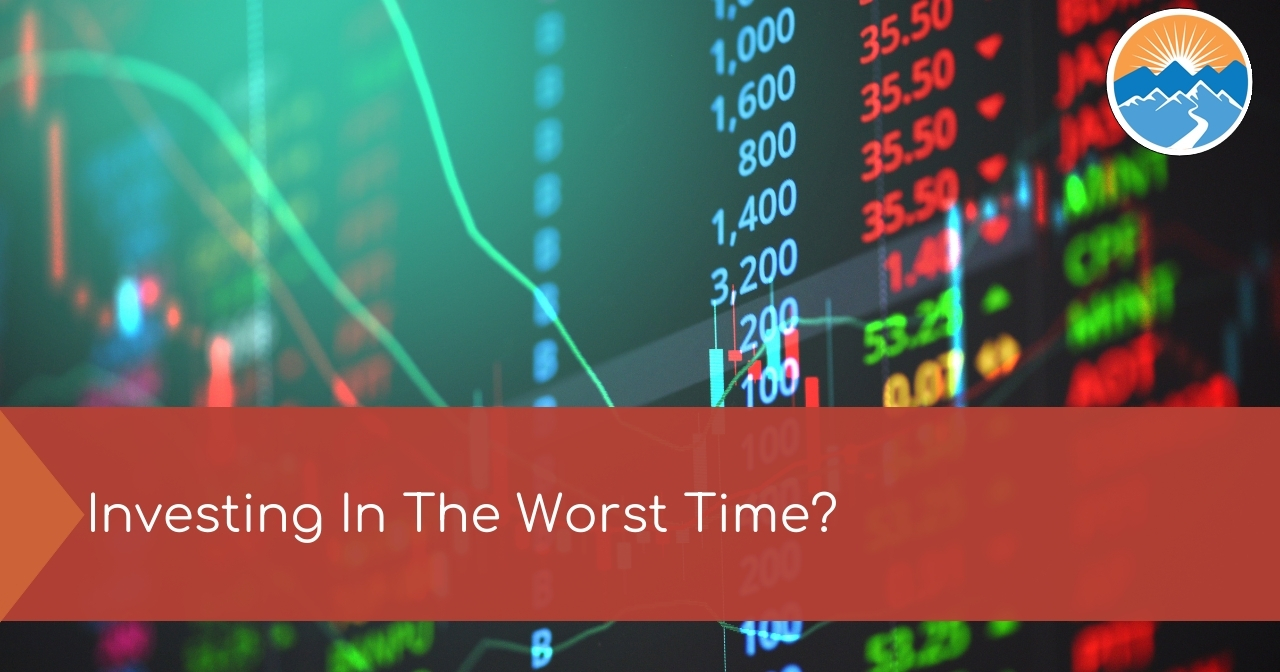The headlines scream uncertainty. Potential sweeping changes in global trade, talk of inflation, rising interest rates, and potential recession fill the airwaves. It certainly feels like the worst possible time to invest. But is it? History often tells a different story.
Gates Pass Advisors believe perspective is crucial, especially during volatile periods. While responses to market downturns range from feeling unsettled to alarmed to panicked, they are also a normal part of the economic cycle. More importantly, history shows that periods of significant market stress have often preceded periods of strong recovery for disciplined, long-term investors.
A Look Back: Crashes and Rebounds
Financial markets have weathered numerous storms. Consider a few examples (*):
- Black Monday (1987): The Dow Jones Industrial Average plunged nearly 23% in a single day. Yet, within two years, the market recovered its losses.
- Dot-Com Bubble Burst (2000-2002): The tech-heavy Nasdaq Composite fell approximately 78% from its peak in October 2002. While the recovery took time, the index eventually surpassed its previous highs and climbed significantly in the following decades.
- Global Financial Crisis (2008-2009): Fueled by the subprime mortgage crisis, the Dow Jones Industrial Average dropped over 53% from its 2007 peak. It was a period of intense fear, but markets began a recovery in March 2009 that led to one of the longest bull runs in history.
- COVID-19 Crash (2020): The onset of the global pandemic saw major indices like the Dow and S&P 500 plummet over 30% in a matter of weeks. The rebound, however, was remarkably swift, with markets hitting new highs later that same year.
The pattern is clear: markets experience sharp declines but have consistently recovered and reached new heights over the long term. Selling during panic often locks in losses, while staying invested (or even adding during downturns, if appropriate for one’s plan) has historically been rewarded.
The Current Landscape: Navigating the Noise
Today’s environment presents its own set of challenges contributing to market volatility:
- Tariffs & Trade: Large tariff increases or additions have stoked geopolitical tensions and continue to influence global trade dynamics. They can disrupt supply chains, increase business costs, add a significant layer of uncertainty to corporate earnings outlooks, and increase consumer end costs, all of which are causing business leaders to express deep concern to the current administration.
- Inflation & Food Prices: Consumers are feeling the pinch directly, particularly with stubbornly elevated food prices (along with recreation, insurance, energy, and housing costs). While unemployment remains low and wage growth continues, whether these trends are sustainable in the face of corporate uncertainty remains unknown. Persistent inflation is the primary driver behind the Fed’s rate hikes and contributes to broader economic anxiety.
- Interest Rates: The U.S. Federal Reserve raised interest rates aggressively through 2022 and into mid-2023 to combat persistent inflation. Higher rates increase borrowing costs for companies and consumers, potentially slowing economic growth and impacting corporate profitability, which can weigh on stock valuations. Throughout 2022 and into 2023, many articles and headlines predicted a recession, which never materialized.
In 2024, with a slowing of inflation, the Federal Reserve initiated 3 rate cuts that have held steady so far in 2025. However, tariffs are widely considered inflationary, so bond yields and mortgage rates have risen in anticipation.
- Market Indices (Nasdaq & S&P 500): The Nasdaq Composite is heavily weighted towards technology and growth stocks sensitive to interest rates, and the broader Standard & Poor’s 500 has also been weighted towards growth technology companies. Each index has experienced significant volatility. They reflect the market’s digestion of economic data, Fed policy signals, and geopolitical events. We’ve seen sharp down days and strong rallies, indicative of investor uncertainty about the path forward.
Perspective for the Path Forward
- Does knowing the historical context make downturns feel comfortable?
- Perhaps not.
- Does understanding the current pressures mean we can predict the market’s next move?
- Absolutely not.
What it does mean is that current conditions – rising rates, inflation concerns, volatile indices – are not unprecedented. Market history teaches us that trying to time the market perfectly (“waiting for the worst to be over”) is often a losing game. The “worst time” in terms of sentiment is often far from the worst time to remain committed to a long-term investment strategy.
At Gates Pass Advisors, we listen to you about your response to the headlines and changes underfoot. We create or adjust your personal financial plan given your life circumstances and needs, confirming your financial safety nets, especially during times of market uncertainty. Client portfolios are built to align with your individual goals, risk tolerance, risk capacity, and time horizon. Market volatility is expected; reacting emotionally is detrimental.
As in difficult times past, our conversations with clients this year and especially this quarter have brought a level of objectivity regarding their positioning that provides relief. Staying disciplined, diversified, and working with an experienced advisor who listens to you is key to navigating challenging times and sticking around to benefit from the eventual recovery.
If you have questions or want to learn more about Gates Pass and our unique Guide Approach to Financial Planning and Advising, click this link to schedule a complimentary consultation.
Disclaimer: This blog post is for informational purposes only and does not constitute financial advice. Past performance is not indicative of future results. Investing involves risk, including the potential loss of principal. Consult with a qualified financial advisor before making any investment decisions. Investment advice is only offered in jurisdictions where Gates Pass Advisors, LLC is registered, exempt, or excluded from such requirements. This blog should not be construed as a solicitation to provide advisory services in other jurisdictions.
(*) List of stock market crashes and bear markets
© The Behavioral Finance Network and Gates Pass Advisors, LLC
This video is narrated by Erik Schei CFA, Senior Advisor with Gates Pass Advisors, LLC – dedicated to educating investors about the ‘gotcha’s’ of mental shortcuts that can reduce investment returns.
